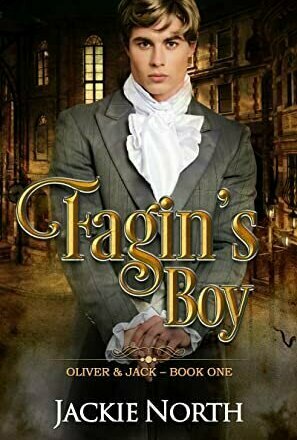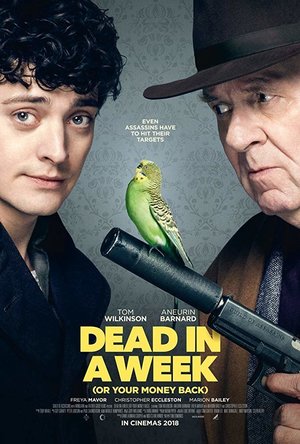Search
Search results
Merissa (13765 KP) rated Fagin's Boy (Oliver & Jack #1) by Jackie North in Books
Apr 21, 2022 (Updated Jun 24, 2023)
FAGIN'S BOY is the first book in the Oliver and Jack series, and as you may have gathered, it follows on from Oliver Twist. Oliver is now seventeen and the story starts with him attending the funeral of the man who took him in and looked after him, Mr Brownlow. Not knowing what will happen to him next, Oliver takes on an apprenticeship at a haberdashery, hoping it will give him experience for when he opens his own, long-dreamed-about, bookstore.
Jack has just returned to London after being hextricated to Australia. I had to suspend belief a little here as I've never heard of that happening before. He is still the cheeky chappie you may recognise but is altogether more fragile and hard. A paradox, for sure. He reminded me of a piece of flint.
Anyway, the story follows Oliver and Jack for a few months as circumstances change for Oliver. I thought the descriptions of the living conditions, plus how the children are treated in the workhouse, to be definitely in keeping with the original book by Dickens, as well as what was hinted at in the musical film.
Whilst Jack revelled in his circumstances, he was also desperate for stories about those he remembers. This leads him to a friendship with Noah, who Oliver doesn't like or trust. Oliver, on the other hand, wants more than he has right now. He wants his bookshop. He doesn't want to steal. He would like Jack to be with him but is prepared to make a break if Jack doesn't want to come.
There is a HFN ending to this first book and I am sure there will be plenty more adventures for our twosome. Although I have read and enjoyed other historical books by Ms North, I can't honestly say I enjoyed this one as much and I'm not sure why. All of the ingredients were there but, for me, they just didn't mix as well as I had expected. I am glad I have read this book and would recommend it to anyone with an interest in Oliver Twist and the hard, grimy Victorian times.
** same worded review will appear elsewhere **
* A copy of this book was provided to me with no requirements for a review. I voluntarily read this book, and the comments here are my honest opinion. *
Merissa
Archaeolibrarian - I Dig Good Books!
Apr 14, 2022
Jack has just returned to London after being hextricated to Australia. I had to suspend belief a little here as I've never heard of that happening before. He is still the cheeky chappie you may recognise but is altogether more fragile and hard. A paradox, for sure. He reminded me of a piece of flint.
Anyway, the story follows Oliver and Jack for a few months as circumstances change for Oliver. I thought the descriptions of the living conditions, plus how the children are treated in the workhouse, to be definitely in keeping with the original book by Dickens, as well as what was hinted at in the musical film.
Whilst Jack revelled in his circumstances, he was also desperate for stories about those he remembers. This leads him to a friendship with Noah, who Oliver doesn't like or trust. Oliver, on the other hand, wants more than he has right now. He wants his bookshop. He doesn't want to steal. He would like Jack to be with him but is prepared to make a break if Jack doesn't want to come.
There is a HFN ending to this first book and I am sure there will be plenty more adventures for our twosome. Although I have read and enjoyed other historical books by Ms North, I can't honestly say I enjoyed this one as much and I'm not sure why. All of the ingredients were there but, for me, they just didn't mix as well as I had expected. I am glad I have read this book and would recommend it to anyone with an interest in Oliver Twist and the hard, grimy Victorian times.
** same worded review will appear elsewhere **
* A copy of this book was provided to me with no requirements for a review. I voluntarily read this book, and the comments here are my honest opinion. *
Merissa
Archaeolibrarian - I Dig Good Books!
Apr 14, 2022

Saving Normal: An Insider's Revolt Against Out-of-Control Psychiatric Diagnosis, DSM-5, Big Pharma, and the Medicalization of Ordinary Life
Book
From "the most powerful psychiatrist in America" (New York Times) and "the man who wrote the book on...
Gareth von Kallenbach (980 KP) rated Repo Men (2010) in Movies
Aug 8, 2019
What does it mean to be both alive and dead?
Based on the novel “The Repossession Mambo” by Eric Garcia, Repo Men is a dark sci-fi action film from director Miguel Sapochnik. It is an oddly sadistic film that begins as a fantastic black comedy/drama, loses its way in the second act with well-shot but mindless action and predictable plot elements, yet still finds its way back before the credits roll.
Remy and Jake, played by Jude Law and Forest Whitaker, are both Repo Men for The Union, an alarming combination of loan shark and artificial organ manufacturer. Those unfortunate patients that fall too far behind on their payments have their artificial parts removed and reclaimed, often accompanied by grisly special effects. Through an accident at a routine repossession, Remy ends up needing a new heart. In the process of trying to pay for it, he realizes that he can no longer find the moral ambivalence necessary to take the life of a stranger in order to earn the money to save his own. This film is definitely not for the squeamish, and many scenes were not unlike watching a surgery in progress.
This film will certainly attract more than a nod from those clamoring for universal healthcare in the United States, as well as those railing against corporate greed at the expense of human life. The Union is everything we love to hate in a corporation. Nothing, from duping emotionally compromised patients, to putting profits above all else, to even killing people, is out of bounds for this corporation. It’s uncommon to see corporate evil of this magnitude in a film, and with Liev Schreiber manning the helm, this evil is personified and delivered with such panache that he becomes an enjoyable caricature to watch.
This movie would be nothing without Remy’s path from classic amoral psychopath to redeemed soul, but the journey at times becomes muddy and obscure. Law plays the part somewhat stiffly, but still manages to shine in his interactions with Whitaker and Schreiber. Whitaker, however, is fantastic as Remy’s uncompromisingly unsympathetic partner Jake, who holds on tightly to what he knows and believes, however unprincipled. By the film’s end, Whitaker’s performance as the frustrated partner becomes even more impressive when compared to Law’s movement from perpetrator to victim to agent of retribution.
For years, Remy had no moral compunction against repossessing organs, nearly always from those who will die without them. But when his heart is removed, he suddenly empathizes with the victims of his profession. An odd paradox: that becoming less human can impart more humanity. Remy is both more genuinely alive after receiving his artificial heart, and more certain he will be dead when he can no longer pay. This is the crux of the film, and on this basis a clever story is told about the intersection of making a living, being alive, and the entanglements they create.
Based on the novel “The Repossession Mambo” by Eric Garcia, Repo Men is a dark sci-fi action film from director Miguel Sapochnik. It is an oddly sadistic film that begins as a fantastic black comedy/drama, loses its way in the second act with well-shot but mindless action and predictable plot elements, yet still finds its way back before the credits roll.
Remy and Jake, played by Jude Law and Forest Whitaker, are both Repo Men for The Union, an alarming combination of loan shark and artificial organ manufacturer. Those unfortunate patients that fall too far behind on their payments have their artificial parts removed and reclaimed, often accompanied by grisly special effects. Through an accident at a routine repossession, Remy ends up needing a new heart. In the process of trying to pay for it, he realizes that he can no longer find the moral ambivalence necessary to take the life of a stranger in order to earn the money to save his own. This film is definitely not for the squeamish, and many scenes were not unlike watching a surgery in progress.
This film will certainly attract more than a nod from those clamoring for universal healthcare in the United States, as well as those railing against corporate greed at the expense of human life. The Union is everything we love to hate in a corporation. Nothing, from duping emotionally compromised patients, to putting profits above all else, to even killing people, is out of bounds for this corporation. It’s uncommon to see corporate evil of this magnitude in a film, and with Liev Schreiber manning the helm, this evil is personified and delivered with such panache that he becomes an enjoyable caricature to watch.
This movie would be nothing without Remy’s path from classic amoral psychopath to redeemed soul, but the journey at times becomes muddy and obscure. Law plays the part somewhat stiffly, but still manages to shine in his interactions with Whitaker and Schreiber. Whitaker, however, is fantastic as Remy’s uncompromisingly unsympathetic partner Jake, who holds on tightly to what he knows and believes, however unprincipled. By the film’s end, Whitaker’s performance as the frustrated partner becomes even more impressive when compared to Law’s movement from perpetrator to victim to agent of retribution.
For years, Remy had no moral compunction against repossessing organs, nearly always from those who will die without them. But when his heart is removed, he suddenly empathizes with the victims of his profession. An odd paradox: that becoming less human can impart more humanity. Remy is both more genuinely alive after receiving his artificial heart, and more certain he will be dead when he can no longer pay. This is the crux of the film, and on this basis a clever story is told about the intersection of making a living, being alive, and the entanglements they create.

Gladiatori Moderni
Book
Bodies, sweat, the direct gaze; strength, courage, doubt; the visual and emotional alphabet of Piero...
An honest and emotional YA read
Grace Welles is fifteen, trapped at a third-rate boarding school in Florida, and pretty much resigned to a lonely and miserable life. Her father has another (real) family in California, sneaking away to occasionally remember that Grace and her beautiful, flighty mother exist. Grace has no friends. But one day she helps a fellow student, Wade, who is being attacked by a group of popular boys. The two form a strange friendship that eventually blossoms into more. Suddenly, life has meaning. But with this meaning, comes feelings, and the realization that there may be more to Wade than his kind and cool exterior.
I've been sitting on this review, because I honestly cannot tell if this book was amazing or terrible. I know, I know--how is that possible? Helnwein has written something very different here, in many ways: a raw, awkward story that often makes you cringe and want to look away. She spares no detail (or language) when covering Gracie's forays into friendship, drinking, and sex. You forget she's fifteen/sixteen, which is probably what makes it so hard, at times. Yes, she's alone at boarding school, but still? Is this what happens at boarding school? Perhaps that's my problem with all boarding school tales. (At least no one gets murdered.) It's a paradox. Grace falls in love with her biology teacher, which seems sweetly realistic. But when he rejects her, she curses him, destroys his property, and more--is this truly allowed, even at a third rate school? Every thing is excused as "needing the tuition money." Not so realistic.
If you're able to overlook the terrifying behavior of these young students (perhaps made all the more frightening to me, as the mother of young daughters, one of whom is actually named Grace), there are some poignant moments here. Helnwein really does capture the beauty and absolute fear of falling in love for the first time, and Grace and Wade's relationship is pretty magical. The self-centeredness of adolescence--how the world revolves around nothing else. Much of Grace's coming of age is realizing that a great big world exists beyond her. But it's tender and sweet watching her fall. There are some cute friendships too.
At many times, this is a funny and heartbreaking book. There are a lot of serious topics hidden between the craziness. Gracie and Wade are truly lovely characters, and I cared for both of them deeply. I think I was just thrown by some of the characters acting/speaking older than their age and the fact that the book truly tells it how it is, right in your face. It takes a bit of an adjustment. I'm not sure this book is for everyone, but there's a tenderness and beauty to it, and I think many teens would enjoy it. 3 stars.
I've been sitting on this review, because I honestly cannot tell if this book was amazing or terrible. I know, I know--how is that possible? Helnwein has written something very different here, in many ways: a raw, awkward story that often makes you cringe and want to look away. She spares no detail (or language) when covering Gracie's forays into friendship, drinking, and sex. You forget she's fifteen/sixteen, which is probably what makes it so hard, at times. Yes, she's alone at boarding school, but still? Is this what happens at boarding school? Perhaps that's my problem with all boarding school tales. (At least no one gets murdered.) It's a paradox. Grace falls in love with her biology teacher, which seems sweetly realistic. But when he rejects her, she curses him, destroys his property, and more--is this truly allowed, even at a third rate school? Every thing is excused as "needing the tuition money." Not so realistic.
If you're able to overlook the terrifying behavior of these young students (perhaps made all the more frightening to me, as the mother of young daughters, one of whom is actually named Grace), there are some poignant moments here. Helnwein really does capture the beauty and absolute fear of falling in love for the first time, and Grace and Wade's relationship is pretty magical. The self-centeredness of adolescence--how the world revolves around nothing else. Much of Grace's coming of age is realizing that a great big world exists beyond her. But it's tender and sweet watching her fall. There are some cute friendships too.
At many times, this is a funny and heartbreaking book. There are a lot of serious topics hidden between the craziness. Gracie and Wade are truly lovely characters, and I cared for both of them deeply. I think I was just thrown by some of the characters acting/speaking older than their age and the fact that the book truly tells it how it is, right in your face. It takes a bit of an adjustment. I'm not sure this book is for everyone, but there's a tenderness and beauty to it, and I think many teens would enjoy it. 3 stars.

Rodigan: My Life in Reggae
Book
'THE BOOK THAT EVERY REGGAE FAN SHOULD READ' John Masouri, Echoes 'Rodigan can still claim a...

Stellaris: Infinite Legacy
Tabletop Game
The Galaxy is vast and full of wonder Academy Games introduces the 4X board game based on the hit...
Lucy Buglass (45 KP) rated Dead In A Week (Or Your Money Back) (2018) in Movies
Jun 20, 2019
Dark comedy at its finest
This review discusses dark topics such as death and suicide. Reader discretion advised.
Getting comedy right is difficult enough, let alone trying to do it with sensitive topics. But Dead In A Week (or your money back) hits the nail on the head. After several failed suicide attempts, William (Aneurin Barnard) signs a contract with veteran assassin Leslie (Tom Wilkinson), who promises he’ll be dead within the week. This simple concept results in 1 hour and 30 mins of pure entertainment.
Though explicit in the way it discusses suicide, there is a reason for this. Right from the start, William is positioned as an incredibly depressed, isolated failed writer, who is struggling to see the point in living. He is very open about this fact, and spends a lot of time planning ways he could do it, accompanied by a darkly funny montage of the ways he’s tried. He is a troubled character that you can’t help but feel sorry for.
What makes this film even more interesting is the way it makes you sympathise with both target and killer. Leslie is trying his best to avoid retirement, and sees William as an answer to his prayers. If he kills him, he’ll fill his quota, and all will be well. This creates a paradox where you want both men to succeed, but you know that’s impossible.
William changes his mind about the contract when a publisher takes interest in his novel, and he begins to fall in love with Ellie (Freya Mavor), the assistant who called him regarding his latest story. This encounter comes with some rather frank and heartwarming messages about life, reminding us how precious life can be if you give it a chance.
Of course, the film doesn’t just end there. After William’s 360, Leslie is having none of it, and for the rest of the film we see this young writer trying to outrun a seasoned assassin. Leslie’s boss Harvey (Christopher Eccleston) is hot on his tail as well, tired of giving the old man too many chances. It’s a classic tale of a failed assassin, flipped entirely on its head.
Filled with some brilliant twists and turns, the script is formulaic yet hugely entertaining, with some laugh out loud moments throughout. It will certainly appeal to those who like their humour a little darker, with its use of comedic timing and deadpan delivery. It addresses so much in a short space of time, adding depth where needed.
Leslie’s wife Penny (Marion Bailey) adds her own comic relief to the situation, with a delightful satire on middle-class culture. Whilst her husband is trying to keep a dangerous job he loves so much, she’s more concerned about beating her church rivals in a cushion competition. The parallels between the couple are simultaneously heartwarming and awkward, and I enjoyed the way they bounced off each other throughout.
This was a thoroughly enjoyable film, with some unexpectedly touching moments. I really connected with certain characters and loathed others, allowing me to become fully invested in the film. The encounter between these two men should have ended one way, but the two embark on a journey that changes their lives for the better. Underneath all the humour comes an understanding of mental health issues, and sympathy for those who struggle.
This was Tom Edmund’s feature length debut, after directing a few short films. It’s an impressive first film with good pacing, solid characters, and a well-polished look throughout. It was an ambitious first feature length, but it certainly delivered.
https://lucygoestohollywood.com/2019/05/06/dark-comedy-at-its-finest-my-thoughts-on-dead-in-a-week-or-your-money-back/
Getting comedy right is difficult enough, let alone trying to do it with sensitive topics. But Dead In A Week (or your money back) hits the nail on the head. After several failed suicide attempts, William (Aneurin Barnard) signs a contract with veteran assassin Leslie (Tom Wilkinson), who promises he’ll be dead within the week. This simple concept results in 1 hour and 30 mins of pure entertainment.
Though explicit in the way it discusses suicide, there is a reason for this. Right from the start, William is positioned as an incredibly depressed, isolated failed writer, who is struggling to see the point in living. He is very open about this fact, and spends a lot of time planning ways he could do it, accompanied by a darkly funny montage of the ways he’s tried. He is a troubled character that you can’t help but feel sorry for.
What makes this film even more interesting is the way it makes you sympathise with both target and killer. Leslie is trying his best to avoid retirement, and sees William as an answer to his prayers. If he kills him, he’ll fill his quota, and all will be well. This creates a paradox where you want both men to succeed, but you know that’s impossible.
William changes his mind about the contract when a publisher takes interest in his novel, and he begins to fall in love with Ellie (Freya Mavor), the assistant who called him regarding his latest story. This encounter comes with some rather frank and heartwarming messages about life, reminding us how precious life can be if you give it a chance.
Of course, the film doesn’t just end there. After William’s 360, Leslie is having none of it, and for the rest of the film we see this young writer trying to outrun a seasoned assassin. Leslie’s boss Harvey (Christopher Eccleston) is hot on his tail as well, tired of giving the old man too many chances. It’s a classic tale of a failed assassin, flipped entirely on its head.
Filled with some brilliant twists and turns, the script is formulaic yet hugely entertaining, with some laugh out loud moments throughout. It will certainly appeal to those who like their humour a little darker, with its use of comedic timing and deadpan delivery. It addresses so much in a short space of time, adding depth where needed.
Leslie’s wife Penny (Marion Bailey) adds her own comic relief to the situation, with a delightful satire on middle-class culture. Whilst her husband is trying to keep a dangerous job he loves so much, she’s more concerned about beating her church rivals in a cushion competition. The parallels between the couple are simultaneously heartwarming and awkward, and I enjoyed the way they bounced off each other throughout.
This was a thoroughly enjoyable film, with some unexpectedly touching moments. I really connected with certain characters and loathed others, allowing me to become fully invested in the film. The encounter between these two men should have ended one way, but the two embark on a journey that changes their lives for the better. Underneath all the humour comes an understanding of mental health issues, and sympathy for those who struggle.
This was Tom Edmund’s feature length debut, after directing a few short films. It’s an impressive first film with good pacing, solid characters, and a well-polished look throughout. It was an ambitious first feature length, but it certainly delivered.
https://lucygoestohollywood.com/2019/05/06/dark-comedy-at-its-finest-my-thoughts-on-dead-in-a-week-or-your-money-back/
Hazel (1853 KP) rated The Keeper of Portals in Books
Dec 17, 2018
<i>This ARC was provided by the author in exchange for an honest review </i>
Awaiting young adult readers in early 2017 is a fantasy story unlike any other. <i>The Keeper of Portals</i> is the debut novel of V.S. Nelson, the soon-to-be-published author with an imagination worth sharing. Incorporating the familiar concept of time travel into a new way of visualizing the world results in a story that will leave minds reeling.
Nelson’s theory is that every aspect of life has a keeper, a creature in charge of making sure their assigned element functions smoothly. There are the major keepers responsible for time, causality and other things that cannot be seen, yet objects as small as buttons have their own keeper, too. Humans, of course, are unaware of these keepers, therefore fifteen-year-old Martin Lockford initially believes he is going mad when the Keeper of Portals reveals his existence in Martin’s bedroom.
Martin and his mother, with nowhere else to go, have moved into a dilapidated manor once owned by a distant relative. Whilst exploring his new room, Martin is startled by a disembodied voice claiming to be the Keeper of Portals. Having not spoken to anyone for 400 years, Portals is eager to show off his role in the flowing of the unpredictable universe. The keeper’s task is to make sure each door leads to the correct place – something that he demonstrates by sending Martin to the <i>wrong</i> places. However, there is one door in the manor that he has been unable to open.
The very next morning, Martin awakes to discover the sealed door is no longer locked and, being the curious boy that he is, goes through to explore. The mystery door does not only transport Martin to a different place, it sends him back in time to 1623. Here he meets the young Isabel, a maid, who is intrigued with the inventions of the future, especially from a personal hygiene perspective. However, she is not the only one curious about the 21st century.
The irascible master of the manor is not who he initially seems. With the desire to control everything, he places Martin and Isabel in a grave predicament, trapping them in the 17th century. At risk of creating a paradox, Martin needs to return to his own time – a difficult feat in itself – however, with the Keeper of Portals missing, the master has caused many problems that need to be solved, otherwise a whole new future will be born.
Admittedly, it takes a while for the story to warm up – the reader may be introduced to the idea of keepers fairly early on, yet the key storyline does not reveal itself until much later. After perseverance on the reader’s behalf, <i>The Keeper of Portals</i>, becomes an exciting mix of fantasy and science fiction, cleverly thought out to create an unpredictable scenario. Adventure after adventure, until bittersweet conclusion, keeps readers engaged and compelled to read on long after bedtime.
Although Martin is the protagonist of the novel, Isabel’s role is equally important. Despite women in the 1600s being deprived on the rights they have in this day and age, Isabel is an intelligent, independent girl, perfectly able to handle everything that is thrown at her. She is an inspiration to teenage girls.
Written with teenage readers in mind, <i>The Keeper of Portals</i> is suitable for fantasy-loving adults, too. With equipoise of adventure and intellectual theory, as well as a touch of romance, it is definitely a book to look out for. V.S. Nelson writes with clarity, exuding remarkable intelligence; let us hope that there will be more from where this came from.
Awaiting young adult readers in early 2017 is a fantasy story unlike any other. <i>The Keeper of Portals</i> is the debut novel of V.S. Nelson, the soon-to-be-published author with an imagination worth sharing. Incorporating the familiar concept of time travel into a new way of visualizing the world results in a story that will leave minds reeling.
Nelson’s theory is that every aspect of life has a keeper, a creature in charge of making sure their assigned element functions smoothly. There are the major keepers responsible for time, causality and other things that cannot be seen, yet objects as small as buttons have their own keeper, too. Humans, of course, are unaware of these keepers, therefore fifteen-year-old Martin Lockford initially believes he is going mad when the Keeper of Portals reveals his existence in Martin’s bedroom.
Martin and his mother, with nowhere else to go, have moved into a dilapidated manor once owned by a distant relative. Whilst exploring his new room, Martin is startled by a disembodied voice claiming to be the Keeper of Portals. Having not spoken to anyone for 400 years, Portals is eager to show off his role in the flowing of the unpredictable universe. The keeper’s task is to make sure each door leads to the correct place – something that he demonstrates by sending Martin to the <i>wrong</i> places. However, there is one door in the manor that he has been unable to open.
The very next morning, Martin awakes to discover the sealed door is no longer locked and, being the curious boy that he is, goes through to explore. The mystery door does not only transport Martin to a different place, it sends him back in time to 1623. Here he meets the young Isabel, a maid, who is intrigued with the inventions of the future, especially from a personal hygiene perspective. However, she is not the only one curious about the 21st century.
The irascible master of the manor is not who he initially seems. With the desire to control everything, he places Martin and Isabel in a grave predicament, trapping them in the 17th century. At risk of creating a paradox, Martin needs to return to his own time – a difficult feat in itself – however, with the Keeper of Portals missing, the master has caused many problems that need to be solved, otherwise a whole new future will be born.
Admittedly, it takes a while for the story to warm up – the reader may be introduced to the idea of keepers fairly early on, yet the key storyline does not reveal itself until much later. After perseverance on the reader’s behalf, <i>The Keeper of Portals</i>, becomes an exciting mix of fantasy and science fiction, cleverly thought out to create an unpredictable scenario. Adventure after adventure, until bittersweet conclusion, keeps readers engaged and compelled to read on long after bedtime.
Although Martin is the protagonist of the novel, Isabel’s role is equally important. Despite women in the 1600s being deprived on the rights they have in this day and age, Isabel is an intelligent, independent girl, perfectly able to handle everything that is thrown at her. She is an inspiration to teenage girls.
Written with teenage readers in mind, <i>The Keeper of Portals</i> is suitable for fantasy-loving adults, too. With equipoise of adventure and intellectual theory, as well as a touch of romance, it is definitely a book to look out for. V.S. Nelson writes with clarity, exuding remarkable intelligence; let us hope that there will be more from where this came from.




